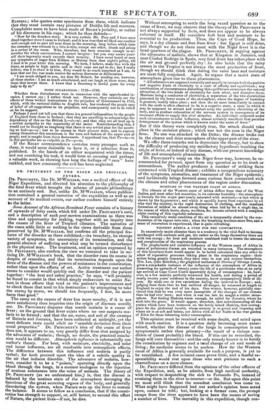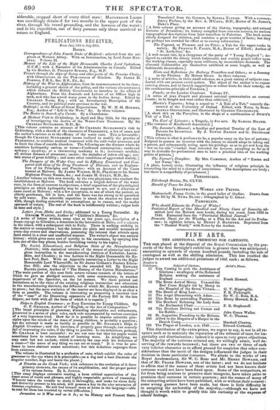DR. PHITcHETT ON THE NIGER AND TROPICAL FEVERS.
DR. PRITCHETT, like Dr. M'WILLIAM, was a medical officer of the Niger Expedition, and directed his attention to the philosophy of the fatal fever which brought the scheme of pseudo philanthropy to an untimely end. But, unlike Dr. McWmusst, whose publica- tion contained a general narrative of the expedition as well as an account of its medical events, our author confines himself entirely to the latter.
Some Account of the African Remittent Fever consists of a history of upwards of' forty cases, which fell under Dr. PRITCHETT'S care, and a description of such post mortem examinations as there was time and opportunity for making, together with an inquiry into the causes of the fever of Tropical climates. The narrative of the cases adds little or nothing to the views derivable from those preserved by Dr. Al`Wimust, but confirms all the principal fea- tures of the disorder as there exhibited,—its treachery, its strange variety of symptoms, the uncertainty of its termination, and the general absence of suffering and what may be termed disturbance in the physical man. The treatment, and an opinion expressed by Dr. PRITCHETT, also confirm the view we ventured to take in no- ticing Dr. MIVILLIAst's book, that the disorder runs its course in despite of remedies, and that its termination depends upon the force of the disease and the powers of resistance in the constitution, rather than upon the efforts of art. Active treatment our author seems to consider would quickly end the disorder and the patient together: "the best and safest practice," he says, "will probably be found to consist in that which simply endeavours to assist Na- ture in those efforts that tend to the patient's improvement and to check those that tend to his destruction : by attempting to take the enemy by storm, we should too frequently, I fear, do more harm than good."
The essay on the causes of fever has more novelty, if it is not more satisfactory than inquiries into the origin of diseases usually are. Dr. PRITCHETT disputes that marsh malaria is a cause of fever ; on the ground that fever exists where no one suspects ma- laria to be formed ; and that the air, water, and soil of the swamps of Batavia and Jamaica, have been collected at midnight, yet the most delicate tests could elicit no "sensible deviation from their usual properties." Dr. ParrenETT's idea of the cause of fever does not, it appears to us, very greatly differ from that assigned by the advocates of malaria ; though, no doubt, the practical conclu- sion would be different. Atmospheric influence is substantially our author's theory. For heat, with moisture, electricity, and solar and lunar influence, are all resolvable into atmospheric effects, The difference between this influence and malaria is partly verbal; for both proceed upon the idea of a subtile quality in the air that induces disorder. The advocates of malaria, how- ever, consider it to be a "poison," operating directly upon the blood through the lungs, in a manner analogous to the injection of noxious substances into the veins of animals. The theory of Dr. PRITCHETT (as we understand him,) is, that the disease is Induced by the noxious state of the atmosphere deranging the functions of the great secreting organs of the body, and generally disordering the system, when Nature sets up the fever to restore the balance. It seems to follow as a conclusion, that if the consti- tution has strength to support, or, still better, to second this effort of Nature, the patient lives—if not, he dies.
Without attempting to settle the long vexed question as to the cause of fever, we may observe that the theory of Dr. PRITCHETT is not always supported by facts, and does not appear to be always coherent in itself. He considers both heat and moisture to be essential to its production. Thus, the Cape of Good Hope, he says, is a dry climate and free from fever : but Egypt is still drier, and though we do not there meet with the Niger fever it is the head-quarters of the plague. Dr. PRITCHETT, in arguing against the advocates of malaria, shows that at Kingston in Jamaica, and near Ciudad Rodrigo in Spain, very fatal fever has taken place with the air and ground perfectly dry : he also holds that the rainy season in the Tropics is not always the most productive of fever, though we should think that during the rains heat and moisture are most fully conjoined. Again, he argues that a moist state of atmosphere gives rise to these phenomena.
" All substances are supposed naturally and usually to contain both the positive and negative kinds of electricity in a state of affinity and equilibrium ; any combination of circumstances disturbing this equilibrium overcomes the natural attraction of the two kinds of electricity for each other, and disunites them. Moisture being a conductor of electricity, a separation of the two electricities possessed by the lower strata of the atmosphere, where the degree of humidity is greatest, readily takes place ; and then the air more immediately in contact with the earth is often observed to be in a negative state, a state in which it may be supposed to attract and conduct away the positive electricity of the body, and so produce exhaustion of the nervous system in consequence of its incessant efforts to supply this vital stimulus. Au individual subjected under such circumstances to solar influence, almost certainly manifests that peculiar derangement of the system which is known under the name of fever."
But if this theory were completely true, the attack should take place in the moistest places ; which was not the case in the Niger fever. No one was attacked in the Delta; the disease broke out in the clearer and drier atmosphere of the upper part of the river.
We offer these remarks not to depreciate the theory, but to show the difficulty of producing any satisfactory hypothesis touching the origin of fever, or indeed of any disease, with our present knowledge of life and atmospheric phmnomena.
Dr. ParrenErr's essay on the Niger fever may, however, be re- commended for perusal, apart from any question as to its truth or
unsoundness. The author produces a number of striking facts connected with Tropical disease ; exhibits a compendious summary of the symptoms, anomalies, and treatment of the Niger epidemic ; and incidentally brings forward some curious facts connected with the climate and other phmnomena of the region under discussion.
MOISTURE OF THE WESTERN COAST OF AFRICA.
The climate of the Western coast of Africa differs from that of the West Indies, and most other hot countries, in its extreme humidity : the atmosphere is literally for the major part nearly saturated with moisture,—a fact which is shown by the hygrometer; and which is speedily learnt from experience by all who visit the country, in the rapid destruction of clothing, and the constant formation of mildew on almost every thing when laid by for a single day, in the course of which boots, shoes, woollens, &c. become covered with a complete white coating of this vegetable substance.
This excessively moist condition of the air is temporarily abated by the con- densation of its vapour into rain; when the breathing becomes more free, and a sense of renovation is experienced, that is quite refreshing.
WESTERN AFRICA A CURE FOR THE CONSUMPTIVE.
In excessively moist climates there is a tendency in the vital fluid to become surcharged with carbonic acid gas, the rather as the lungs themselves there sot with less energy ; for heat and moisture combined tend to lessen the amount and completeness of the respiratory process. The prophylactic and curative influence of the Western coast of Africa in cases of pulmonary disease are recorded in many instances. The atmosphere of this luxuriant shore would appear to be better calculated than any other to allow of reparative processes taking place in the respiratory organs : their action being greatly lessened, they have time to rest and recover themselves. Mrs. Lee, (late Bowdich,) the graphical authoress of Stories of Strange Lands, gives a remarkable instance of the influence of the atmosphere of Africa in preserving for upwards of twenty years the life of a gentleman who at an early age arrived at Cape Coast Castle apparently dying of consumption : he, how- ever, in a few months perfectly recovered his health, and dining a period of nearly twenty years' residence in the country, knew comparatively little of ill- ness. He made one or two excursions during the interval to Europe ; and, judging from these that he had outlived all danger, he returned at length to England to enjoy the rest of his days. One winter, however, painfully con- vinced him that he was even more susceptible of the changes of our climate than he had ever been ; and when it was too late he sought a milder atmo- sphere. Not finding Madeira warm enough, he sailed for Jamaica, where he sank into the grave. It would appear, therefore, that notwithstanding all the praises which have been bestowed on the lovely island Madeira, that resting- place for the phthisical invalid, whose scenery is so grand and imposing and whose air is so soft and balmy, yet Africa with all her faults is the true garden of Eden for those labouring under consumption.
This opinion must be received with some doubt, and acted upon with much caution. It is a question daily becoming more enter- tained, whether the disease of the lungs in consumption is not symptomatic rather than primary—the result of a vicious con- dition of (most probably) the blood. If this can be remedied, the lungs will cure themselves : and the only remedy known is to fortify the constitution by regimen and a total change of air and mode of living ; for medicine seems to be useless. How far the Western coast of Africa is generally available for such a purpose, is yet to be established. A few isolated cases prove little, and a fearful re- sponsibility would rest upon those who sent patients to such a charnelhouse on a mere chance.
Dr. PRITCHETT differed from the opinions of the other officers of the Expedition, and, as he admits, from high medical authority, with respect to despatching the sick to Fernando Po, instead of retaining them in the river to recover—or die. But upon this point we must still think that the soundest conclusion was come to. What might have happened had our author's opinion been acted upon, cannot be told; but, looking at a former case, the prompt escape from the river appears to have been the means of saving a number of lives. The mortality in this expedition, though con- siderable. stopped short of every third 111110 : MACGREGOR LAIRD was unwillingly detained for two months in the upper part of the river, through his vessel grounding, and the lowness of the water ; and in his expedition, out of forty persons only three survived to return to England.



























 Previous page
Previous page